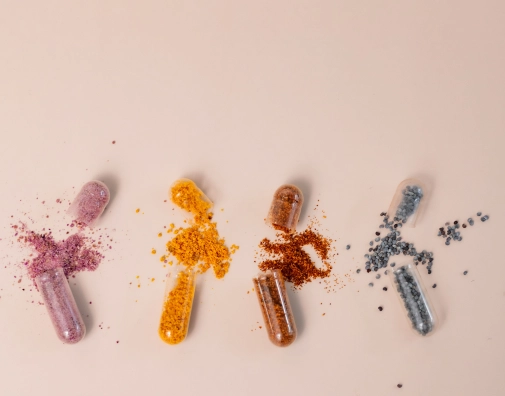
Your DNA and Winter: Is Your Immunity Genetically Ready?

Autumn is fading, coats are coming out, and so is the season of sniffles, sore throats, and “that virus everyone seems to have.”
Every year, we promise ourselves to sleep better, eat better, take better care… and yet some people still catch everything that’s going around.
What if part of the answer was hidden in your DNA?
Our genes influence not only how strong our immune system is, but also how our bodies react to viruses, bacteria, and even vaccines.
Far from being deterministic, the genetics of immunity helps explain why we respond differently to infection — and how we can better prepare for winter.
The Genes That Stand Guard
1. HLA genes: the ID card of our immune system
HLA (Human Leukocyte Antigen) genes act like a biological ID card for our immune defense.
They help immune cells distinguish between “self” and “non-self” — deciding what belongs and what needs to be attacked.
There are hundreds of HLA variants, each influencing how we respond to infections and vaccines.
Some combinations produce a faster, stronger immune response, while others lead to slower or more inflammatory reactions.
That’s why two people exposed to the same virus may have very different experiences: our immunity is as unique as our DNA.
2. IL6: the inflammation gene
The IL6 gene codes for interleukin-6, a signaling molecule that activates our immune defenses.
However, too much IL-6 can backfire: chronic or excessive inflammation weakens the body and makes it more vulnerable to infections.
Certain IL6 variants are linked to stronger inflammatory responses, while others help maintain better balance.
This difference may explain why some people experience more severe symptoms or take longer to recover.
3. TLR genes: the body’s early warning system
TLR (Toll-Like Receptor) genes act as the immune system’s sentinels.
They recognize invading pathogens the moment they enter the body, triggering an immediate immune reaction.
Genetic variations can make these receptors more or less sensitive.
Some people’s immune systems detect threats quickly and respond effectively — others react more slowly, giving pathogens a head start.
The Microbiome: an Overlooked Organ of Immunity
Our immune system doesn’t work alone.
Inside our gut lives a vast community of bacteria — the gut microbiome — that helps regulate inflammation, produce vitamins, and train our immune cells.
A healthy, diverse microbiome strengthens the gut barrier and improves immune balance.
A weakened one — often caused by stress, poor diet, or lack of fiber — leaves us more vulnerable.
And yes, the microbiome is partly influenced by genetics.
Certain genes shape which microbes thrive in our gut and how efficiently we metabolize the nutrients that feed them.
Vitamin D: A Genetic Messenger for Immunity
Vitamin D plays a crucial role in immune regulation.
It supports the production of natural antimicrobial peptides and helps balance inflammation.
But not everyone processes vitamin D in the same way.
Genes like VDR and GC (which we also mentioned in our first winter article) determine how sensitive your body is to vitamin D.
Someone with a less active VDR receptor might need higher vitamin D levels to maintain strong immune protection.
Immunity, Genetics and Lifestyle: A Flexible Equation
Genetics set the framework, but lifestyle writes the story.
Our habits directly affect how our immune genes express themselves — this is the principle of epigenetics.
- Sleep strengthens immune cell function and regulates cytokines.
- Moderate exercise boosts circulation of white blood cells.
- A varied, fiber-rich diet nourishes the microbiome and controls inflammation.
- And in Canada’s long winter, vitamin D from daylight or supplements remains a must-have ally.
Testing, Understanding, Acting
Modern DNA health tests can analyze genetic variants related to immunity (HLA, IL6, TLR, VDR), offering a personalized look at your immune response.
Combined with biomarker tests (vitamin D, inflammation, antibodies, etc.), they provide a more complete picture of how your body defends itself.
Knowing your biology means you can take preventive, targeted action before imbalances develop.
In Conclusion
Our immune system isn’t a fixed shield — it’s a living, adaptive, deeply personal network.
It carries the memory of our ancestors, our environment, and our everyday choices.
This winter, strengthening your immune system isn’t just about “taking vitamins.”
It’s about listening to what your genes have to say — and responding wisely.
Your DNA has answers.
Scientific References
- Klein J. & Sato A. (2000). The HLA system: first of two parts. New England Journal of Medicine.
- Fishman D. et al. (1998). The IL-6 gene polymorphism and inflammatory response. Journal of Clinical Investigation.
- Schröder N.W. et al. (2004). TLR polymorphisms and susceptibility to infection. Nature Immunology.
- Belkaid Y. & Hand T.W. (2014). Role of the microbiota in immunity and inflammation. Cell.
- Aranow C. (2011). Vitamin D and the immune system. Journal of Investigative Medicine.
Other Journal: DNA
VIEW MORE


